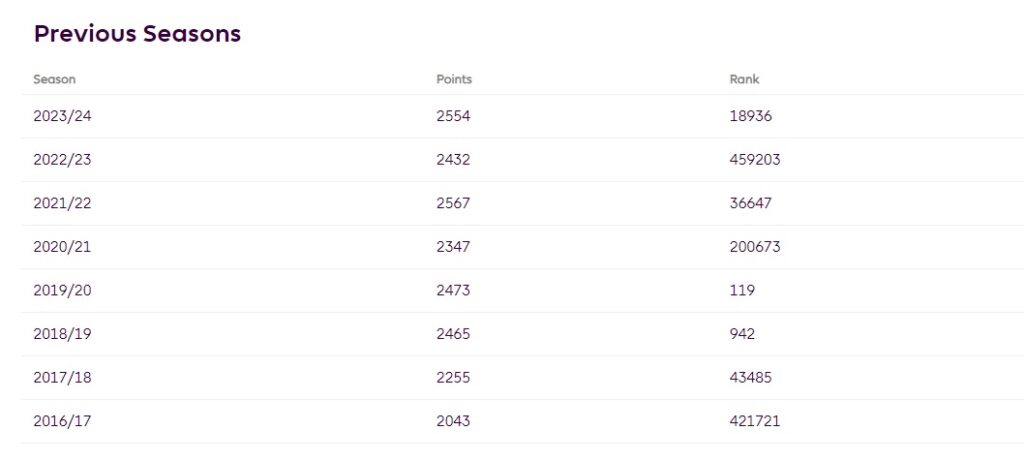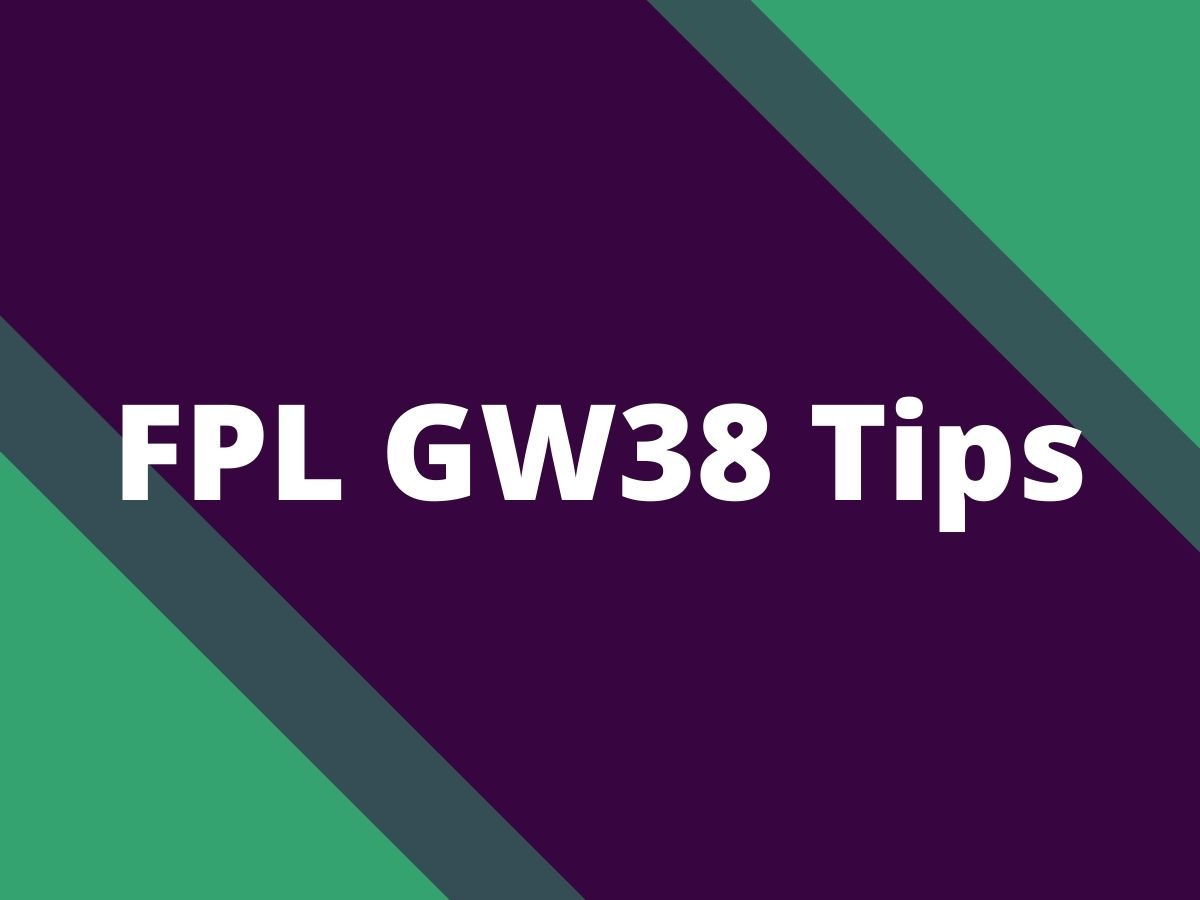These are some of my older thoughts I put together after finishing two times in a row in the top 1K of Fantasy Premier League (942nd in 2018/19 and 119th in 2019/20.
But I think, they are still relevant and can be applied to your FPL strategy even now in the 2024/25 season.
My full season history. It has ups and downs, but the core concepts of my thinking about FPL remain the same.
But that is not up to me to judge. So, let’s dive right in.

Perhaps my two good rankings were more about luck rather than about those key ideas I am going to present to you.
But that is not up to me to judge. So, let’s dive right in.
1. Think long-term rather than short-term
Is picking a fantasy team just for one gameweek and not for a longer time period a good thing or a bad thing? Some FPL managers might say it is a bad thing. The truth is that it depends.
If picking a team just for one gameweek is a consequence of a manager’s short-sightedness, then yes, it is a bad thing. He will most likely get a blazing score in that gameweek, but then his team will suffer in the following rounds.
However, it is not a bad thing to pick the team just for one matchday, if it is a part of your long-term strategy. For example, if you want to wildcard in the following round. That’s why it is important to think long-term and have a long-term strategy in place.
Money on the financial market is not made overnight and the same goes for collecting points in the Fantasy Premier League.
2. Manage your FPL team like a stock portfolio
Warren Buffet once denoted the book Intelligent Investor as the best book about investing ever. One of the main takeaways from this book is that an intelligent investor buys undervalued stocks and sells overvalued stocks. And we can apply this to fantasy football, too.
Buying undervalued players and selling overvalued players can be a great strategy if it is done correctly. And that is the tricky part.
The main difference between the stock portfolio and the FPL portfolio of players in your team is that the output of the stock portfolio in the financial market is measured in money. So, we are deciding whether stock is undervalued or overvalued based on its price.
However, the main output of your fantasy team, your FPL portfolio, is measured in points (not in the team value). You want to pick players who are undervalued in terms of points they have scored so far and not undervalued because of their price.
Price changes can be misleading in fantasy football, and your main goal is not to pick a team that will have the biggest money value at the end of the season but a team that will score the most points.
Of course, player’s prices are hugely important when deciding about the structure of your team (more about structure later in the article). However, when you want to assess which players are undervalued and overvalued, do it in terms of the points they scored and not their prices.
3. Manage risks wisely in your fantasy team
We will continue with the idea of comparing Fantasy Premier League to the financial market. If you want to succeed in the financial market, you need to manage risks very wisely.
Again, the same applies to fantasy football. We have the whole article about this topic, so if interested, do not hesitate to read it: Managing risks in FPL.
4. Eliminate losses where you can
You can increase the points that your team will score in FPL by picking the right players (obviously), or (and!) by eliminating losses, especially hits. Hits are useful only if your team is really looking bad, you do not have the right players in your team or a lot of your players are injured (only then!).
Then hits can help you to rebalance your squad but for a very high cost. You want to prevent this situation. Do not allow your team to get to bad shape and you will never ever have to take a hit. It will save you a lot of points and it will have a very positive reflection on your final ranking.
5. Always think about probabilities
Always think about probabilities. Probabilities will help you to evaluate all possible outputs. Fantasy Premier League is a chaotic system (like all fantasy games, like almost everything in the universe).
Thanks to The Chaos Theory, we know that (sometimes) the behavior of a chaotic system can be fairly predictable. I think that probabilities are the best tool for predicting what will happen, which players will score the most points, or which team will keep a clean sheet.
You do not have to use advanced techniques like converting bookies odds into probabilities, or something like that. No. But at least, when you are picking your FPL squad think about probabilities. Think about all possible outputs, and compare players based on which one is most likely to score.
According to The Law of Large Numbers, it is very hard to predict the result of one observation (in our case, for example, a score of one FPL gameweek). When you roll the dice once, you can’t really guess the output. You can only estimate probabilities.
You know that you will get six with a probability of 1/6 (like any other number on the dice) but that’s all. However, when you roll the dice 100 times, you can pretty accurately expect that you will get six around 17 times (100 * 1/6).
Applying this approach to the FPL, it is almost impossible to predict the output of a single gameweek. However, the output of 38 gameweeks can be fairly predictable due to Chaos Theory and The Law of Large Numbers.
Of course, there will be a lot of variance, but you should always have a bigger picture in mind. Long-term predictions are the most accurate predictions in FPL.
6. Optimize, optimize, optimize
All fantasy games are optimization tasks. That’s why you need to have some sort of a structure of your FPL squad in place. The optimized structure with price points, positions, types of players, etc. All the tiny things that you think will get you very close to the global optimum of the optimization task.
You can use a lot of optimization methods (simple or advanced, it’s up to you) to figure out what is the best structure for your FPL team. There is no one “best structure” in general (that’s why I will not share mine with you).
You just need to know, where are spots in your team that will get you the most points and how to combine players, transfers, and captains to get the highest score possible. When you define the structure of your team, it will help you tremendously with Fantasy Premier League success.
No FPL manager will ever have “the perfect season” with a score like 3800 points (the season where he does everything right, where he always has gameweek top scorers in his team, where he always captains gameweek highest scoring player, etc).
We can only get fairly close to this global optimum with around 2700 points (that is really far away from the global optimum of 3800 points). From a mathematical point of view, when we are so far away from the global optimum, there are many many possibilities for how we can get around 2700 points (not just one possibility).
It means, that there is not just one combination of players, transfers and captains that can bring you success in FPL. There is only one combination of players, transfers and captains that would bring you a perfect score of around 3800 points (assuming that there is only one global optimum).
But for points around the optimum, there is a lot of combinations lying on the same indifference curve. That’s why you should not be afraid to have a different team from a template. If the structure of your team is correct, your team can score the same amount of points as the template (in the long term).
7. Keep your emotions in check
The most trivial tip from all tips. But the most important one.
I mean no one ever got rich in the financial market by making rage and emotional trades. FPL is very similar. Keep your emotions in check. Always. Make some set of rules that will help you with that.
For example, if it drives you crazy then do not watch the games or do not check the score until gameweek is over. Or no transfers until Friday after press conferences. Basically, anything, any rule that will keep you calm for your decision-making process.
Conclusion
Well, that’s all. I hope those tips make sense to you and that they helped you at least a little bit to look at the Fantasy Premier League from a different point of view.

![3 Best Captain Picks for FPL GW38 [Captaincy Index] fpl best captain picks](https://www.fantasyfootballreports.com/wp-content/uploads/fpl-best-captain-picks.jpg)

